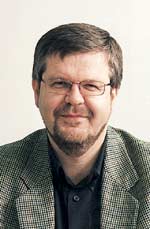 |
 |
Location
Accommodation
About
Madrid
Sponsors and
Supporters
|
Keynote
Speaker - Dieter Rombach
University of Kaiserslautern & Fraunhofer IESE Kaiserslautern, Germany |
 |
Keynote: Teaching How to Engineer Software
Thursday, 20th March - 9:15
Engineering competence requires both a sound scientific foundation and engineering skills for solving concrete problems. Software engineering is based on scientific foundations from several areas including mathematics, computer science, and the economic and social sciences. Active experience exists in the form of empirical observations, laws and theories. Most software engineering curricula address foundations from computer science only, ignore the existing body of knowledge, and provide few means for actively practicing the actual engineering. It is not acceptable to release graduates into software engineering practice without basic ideas about economic value models for software and software engineering, team work, motivation and empirical methods. Neither is it acceptable to release graduates without comprehensive knowledge regarding the already existing body of software engineering knowledge to build upon. This talk provides an outline for comprehensive software engineering education; presents an overview of teachable software engineering knowledge in the form of empirical observations, laws and theories; discusses the use of empirical studies and experiments as an efficient form of learning engineering skills; and proposes different forms of integration with basic computer science curricula. Finally, a concrete software engineering curriculum at the University of Kaiserslautern and first experiences are presented.
Brief Biographical Sketch
Dr. H. Dieter Rombach is a Full Professor in the Fachbereich Informatik (i.e., Department of Computer Science) at the Universität Kaiserslautern, Germany. He holds a chair in software engineering, and is executive director of the Fraunhofer Institute for Experimental Software Engineering (IESE) which aims at shortening the time needed for transferring research technologies into industrial practice. His research interests are in software methodologies, modeling and measurement of the software process and resulting products, software reuse, and distributed systems. Results are documented in more than 120 publications in international journals and conference proceedings.
Prior to his current position, Dr. Rombach held faculty positions with the Computer Science Department and UMIACS (University of Maryland Institute for Advanced Computer Studies) at the University of Maryland, College Park, Maryland [1984-1991] and was a member of the SEL (Software Engineering Laboratory, a joint venture between NASA, Goddard Space Flight Center, Computer Sciences Corporation, and the University of Maryland) [1986-1991].
He received his B.S. degree in mathematics from the University of Karlsruhe, Federal Republic of Germany, in 1975, his M.S. degrees in mathematics and computer science from the University of Karlsruhe in 1978, and his Ph.D. degree in computer science from the University of Kaiserslautern, Federal Republic of Germany, in 1984. In 1990 he received the prestigious Presidential Young Investigator Award (US$ 500,000.00) from the National Science Foundation, USA, in recognition of his research accomplishments in software engineering. In 2000 he was awarded the Service Medal of the State of Rhineland-Palatinate, Germany, for his accomplishments in software engineering research and his contributions to the economic development of the state through the establishment of a Fraunhofer institute.
Dr. Rombach heads several research projects funded by German Government, European Union and Industry. He currently is the lead principal of a federally funded project (ViSEK) aimed at building up a German repository of knowledge about innovative software engineering technologies. He consults for numerous companies on issues including quality improvement, software measurement, software reuse, process modeling and software technology in general, and he is an advisor to Federal and State Government on software issues. He frequently gives industrial executive seminars on software quality improvement, software measurement, software reuse, and process modeling. He was Co-Guest-Editor of two Special Issues in IEEE Software, on Software Quality Assurance in September 1987 and Measurement-Based Process Improvement in July 1994, respectively, and organized the International Workshop on Experimental Software Engineering Issues in Dagstuhl, Germany, September 1992. He served as General Chair of the 18th International Conference on Software Engineering in Berlin, 1996. He is an associate editor of the Kluwer Journal "Empirical Software Engineering" and serves on the editorial boards of numerous other journals and magazines. He is a member of GI and ACM, and a Fellow of IEEE.